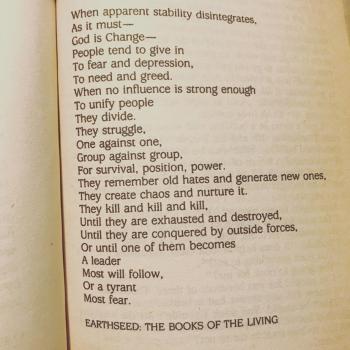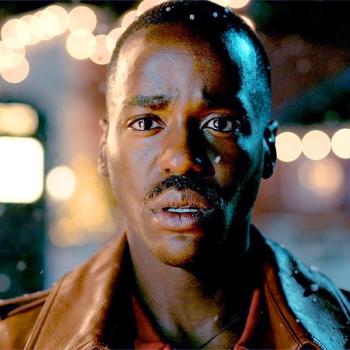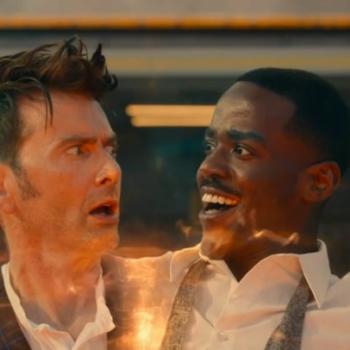I find myself in two minds about the episode “Paradise Towers.” It certainly gives impressive expression to the Seventh Doctor’s persona. But the plot of the story seems in many respects to bring things down to the level of a relatively unconvincing children’s show. And while Doctor Who has always been a show for children, it has generally been a show that was not just for children.
 Perhaps the key to appreciating the episode may be found in the Doctor’s own words early in the first of the four parts: “Nothing is just rubbish if you have an inquiring mind.”
Perhaps the key to appreciating the episode may be found in the Doctor’s own words early in the first of the four parts: “Nothing is just rubbish if you have an inquiring mind.”
The Doctor and Mel visit Paradise Towers, an impressive building with an impressive swimming pool that Mel is looking forward to swimming in. That in itself is a rather unpersuasive premise – the entire universe at your disposal, and this swimming pool in this particular building is where you want to go to swim? The pool itself, when we eventually see it, is fairly mundane.
The building itself seems to have ended up cut off from the rest of the planet and perhaps the rest of the cosmos. It is inhabited by Kangs – gangs of girls who talk in an odd dialect with unusual expressions; by Caretakers who rigidly seek to organize life in the building by their rulebook which they quote chapter and verse; and residents, older people a couple of whom have resorted to eating rats and, when they can catch them, people.
On the one hand, perhaps if we were to ever really encounter an alien culture, it might seem as odd, as silly, as ridiculous as the behavior of the characters in this episode (including Kangs with names like “Bin Liner” and “Fire Escape”). On the other hand, perhaps the ridiculousness points towards the real point being symbolic or allegorical.
 The building “Paradise Towers” was designed by Kroagnon, known as “the great architect.” He also designed other famous buildings and locations, including “Miracle City.” The latter jogs the Doctor’s memory, since the name Kroagnon had seemed familiar to him. Kroagnon was eccentric, and having designed what he considered perfect buildings, he resented the residents whose occupation of them inevitably detracted from their cleanliness and splendor.
The building “Paradise Towers” was designed by Kroagnon, known as “the great architect.” He also designed other famous buildings and locations, including “Miracle City.” The latter jogs the Doctor’s memory, since the name Kroagnon had seemed familiar to him. Kroagnon was eccentric, and having designed what he considered perfect buildings, he resented the residents whose occupation of them inevitably detracted from their cleanliness and splendor.
Kroagnon, it turns out, had had his mind imprisoned in a machine in the basement. But he manages to take control of the chief caretaker and set about seeking to eliminate the living flesh that pollutes the worlds he created. Indeed, he had been making various people “unalive” by controlling automated cleaning robots that roam the building, even before claiming a body and escaping from the basement.
The danger his freedom poses eventually brings the major inhabitants of the building together, united against a common threat.
Is the great architect an allegory for a particular understanding of God? This creator, whose appropriate residence is seemingly to be trapped in the underworld by his creations, is a self-absorbed tyrant whose interest is in having a perfect world, not in the meaningfulness of lives lived by ordinary people within it. It is perhaps not surprising that the caretakers, mistaking the Doctor for the great architect, want to kill him.
In another appropriate inversion, the uniting of the inhabitants of the creation takes place on the highest level, where the pool is. And I thought for sure I caught a glimpse of a chapel adjoining the pool deck, veiled off behind a curtain. One could perhaps even usefully explore parallels with Gnosticism, with an incompetent but proud creator making a world in which sparks from the divine realm of light are viewed as pollutants.
Most of the online reviews I’ve read are very appreciative of the episode, but view its satirical criticism as aimed at more mundane matters, such as the effects of urban housing developments in apartment blocks. “Build high for happiness.”
I still find myself puzzled by this relatively bizarre and at times unconvincing episode. Is my finding allegorical depth in it a perception on my part of something the writer intended? Or is it merely confirmation of the Doctor’s words I quoted earlier – “nothing’s just rubbish if you have an inquiring mind”?
















